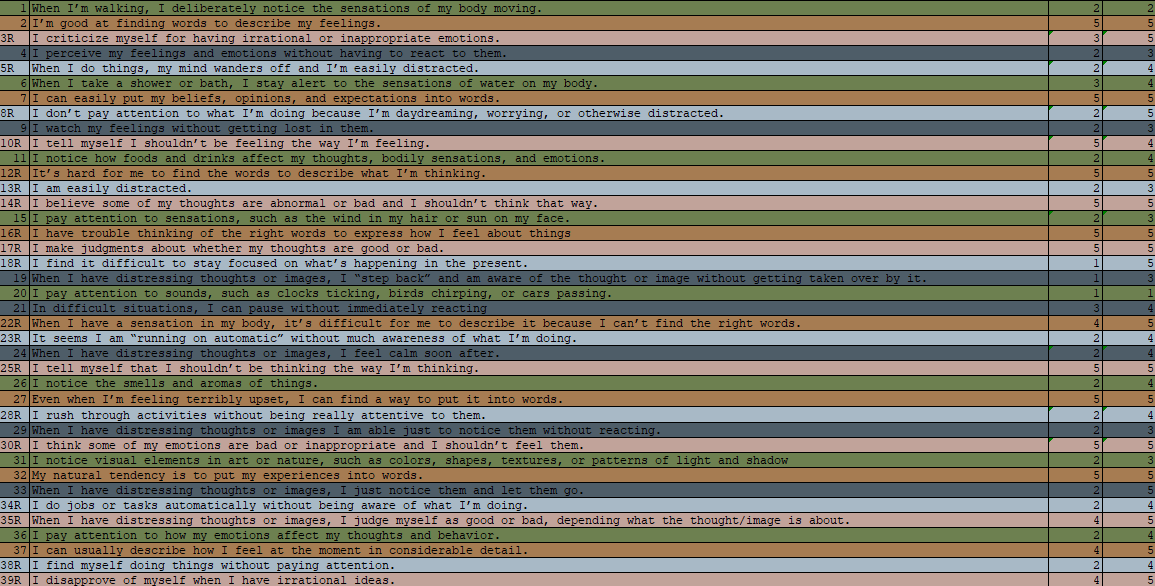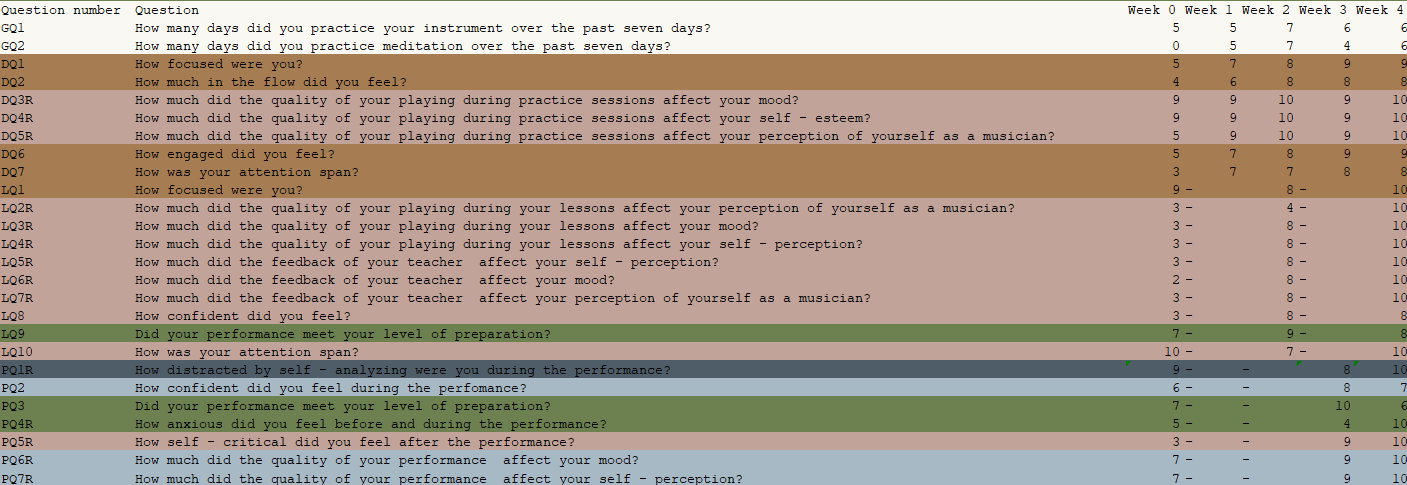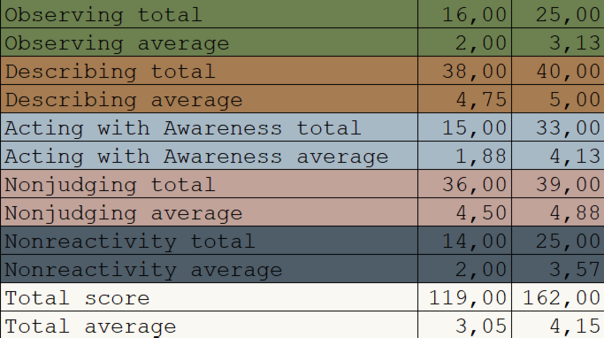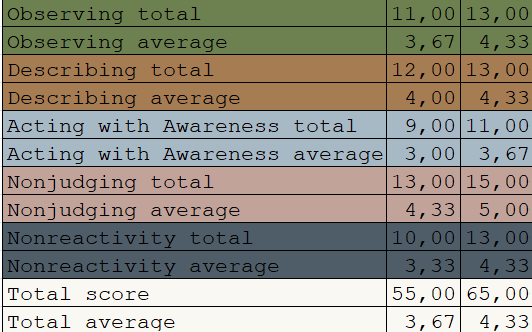| Code | Meaning |
| MPA Evaluating Question | |
| Self - Perception Evaluating Question | |
| Focus Evaluating Question | |
| MPA and Focus Evaluating Question | |
| MPA and Self Perception Evaluating Question |
Go to the previous page
During the first week of practicing meditation, I noticed a big difference in focus-related questions (Table 6). This category continued to improve throughout the entire intervention, reaching its peak while I was practicing brass-related meditation before each practice session. Even though the data was gathered less frequently, it is also evident that negative self-perception-related questions improved quite a lot, with the majority of them improving by as much as 7 or 8 points out of 10. Answers to MPA-related questions didn’t improve as much as other categories, but the improvement is still noticeable.
According to the data gathered from this questionnaire, my daily practice sessions improved the most in focus. In my lessons, I noticed a major improvement in self-perception and mood regulation, and during performances, the biggest improvement was seen in MPA and self-perception-related questions.
To conclude the data gathered from the self–experimentation log, weekly questionnaires, FFMQ, and MfM, it can be said that I have noticed a significant difference in my ability to deal with the mental challenges of being a musician. Both guided general and music–oriented meditations proved to be a valuable measure to improve my focus during daily practice sessions. I measured this difference by using my self – experimentation log, weekly questionnaires, as well as the acting with awareness facet in the MfM and FFMQ. The improvement in the scores when evaluating such statements as the MfM’s "I'm easily distracted when practising my instrument" and the FFMQ’s "When I do things, my mind wanders off and I’m easily distracted" shows an improved ability to stay concentrated and greater resilience to distractions. The improvement in the scores for certain observing statements of the MfM (such as "When I am practising, I pay close attention to how things physically feel or sound as I am playing") also shows deepened levels of concentration.
I have also noticed a major improvement in self–perception and mood regulation. In the self–experimentation log, I have noticed that my self–perception and mood were no longer dependent on teachers' approval or the quality of playing. Even if I received negative feedback or was unhappy with my playing quality, it took me less time and effort to come back to normality. Self–perception and mood regulation improved not only regarding lessons but also performances. I have observed improvement in the lessons and the performances not only in the self – experimentation log and weekly questionnaire, but in FFMQ and MfM as well. The improved score in the nonjudging facet in both questionnaires, where such statements as "I criticize myself for having irrational or inappropriate emotions" and "I'm always criticizing myself in instrumental lessons" are present, shows less judgment, more self–acceptance, and better self–perception.
MPA is another major issue among musicians. As I have noticed in my self–experimentation log, even though my MPA in some cases was as prevalent as ever, it didn’t affect my performance quality as much. Similar findings were noticed in the weekly questionnaire, where some of the questions related to MPA improved as much as 5 points. Improvement in the nonreactivity scores, which evaluated such statements as FFMQ’s "I watch my feelings without getting lost in them" and MfM’s "If something unexpectedly happens when I am on stage, I notice it without reacting and easily carry on performing," shows that after finishing this intervention, my performance on stage is not as much affected by feelings as it was before as it is easier for me to notice when the way I would usually react to particular situation would be overall harmful to my performance.
While both general guided meditations and music – oriented guided meditations were useful tools to help me cope with music – related mental challenges, I have noticed several differences between them. The main difference I have noticed is that the answers to focus questions showed a little bit higher results after music – oriented meditation. As I have mentioned in my self – experimentation log, I felt that including playing in the meditation helped me to connect with my instrument more as well as make the transition between the meditative state of mind and practicing easier, thus helping me to bring meditative awareness from the meditation practice to the instrument practice.
Furthermore, the improved connection with the instrument helped me to be more aware of the physical aspects of playing and thus took my engagement during the practice session to a higher level.
The total averages of both questionnaires increased by more than 0.5 out of 5, which is more than 10% of the total possible score (Table 7, Table 8). In the FFMQ, the biggest increase was observed in the acting with awareness facet, followed by nonreactivity and observing (Table 9). In the MfM, the biggest increase was observed in the nonreactivity facet, followed by observing, acting with awareness, and nonjudging (Table 10).
Self-Experimentation Log
This chapter documents my personal experimentation with meditation, both as a way to gather firsthand data for this research and as an attempt to improve my ability to deal with the mental challenges of being a brass musician. This measure allowed the observation of qualitative changes during the meditation intervention as well as a comparison of the effects of both general and brass-related meditations on the same subject. The log was filled in daily in order to register focus levels and self-perception changes after each day‘s practice session.
In case a lesson happened on that given day, I would also log my focus levels during the lesson, my self-perception, self-esteem, confidence, and level of performance in comparison to what I could have done during my private practice sessions. Similar aspects were logged in case a performance happened on that particular day as well, with the addition of logging my levels of anxiety, being distracted by self-analyzing during the performance, and self-criticism after the performance.
As an addition to the qualitative data, every week I would fill out the same weekly questionnaire which was provided to participants of the experiment, as well as FFMQ and MfM before and after the whole intervention. The whole timeline of the self-experimentation log spanned six weeks. The first two weeks were dedicated to establishing the zero-point: I logged the data without having started the meditation at the beginning of the practice sessions. Weeks 3 and 4 describe the effects of conventional guided meditations in the beginning of the practice sessions, and the two final weeks log the effects of brass-oriented guided meditations.
Week 1
I started logging my practice sessions right after I came back from being sick; thus, in addition to my usual practice routine at the time, I had to deal with all the difficulties that are present while trying to come back into shape. I also logged this being a very busy time with plenty of projects, so I was generally unhappy with the time that I could dedicate to practicing. Focus levels varied highly, ranging between being able to focus very well and spending the majority of time procrastinating.
Regarding lessons and rehearsals, I had the tendency to take things personally and be highly affected by feedback in negative ways, such as being frustrated and worrying about how other players perceived me. However, it is worth mentioning that during this specific week, I was in the luteal phase of my menstrual cycle, and I had noticed the correlation between it and an impaired ability to take feedback in a professional and non-reactive way.
I played one concert during this week. I felt that I played the concert well in comparison to what I could do, even though I admitted to paying more attention to the way the audience perceives me than I would like. This led me to feeling a little bit anxious and self-analyzing during the performance, but my self-perception didn’t change much, and I wasn’t leaning towards self-criticism after playing.
Week 2
Practice sessions were still varied in their levels of focus, ranging from me being totally unfocused to having excellent practice sessions. The lessons that week were not going that well, as it took me quite a while to get proper focus, so in the very beginning, I was playing far worse than I could. That affected my self-confidence in a negative way, and I got upset because of this.
I played two concerts that week. In both of them, I felt very uncomfortable due to external circumstances such as acoustics, the instruments of the ensemble, and balance. Being uncomfortable led me to playing worse than I could, and even though I knew that external circumstances had affected the way I played, I was very self-judgmental after the performances.
Week 3
I noticed a massive improvement in my focus levels. Most days, I could start practicing right away, and even on the days where it was difficult to start, meditation made it much easier. I described many of the sessions as very productive, except for a couple of cases where non-music-related things made me so frustrated that I couldn’t do anything for the rest of the day.
Because most days I practiced well, I was also feeling quite good as well. Even if it was not for the worse, my self-perception was still affected by the amount of success in my practice sessions. Unfortunately, I did not have any lessons or performances that week.
Week 4
Even though on most days I noted not having enough time to practice, all the meditation sessions I logged turned out to be very focused. As I practiced quite well, I was feeling the same way as well.
In the lessons, I performed according to my capabilities, even though I got distracted by some organizational things because it was the last lesson before my Main Subject Exam. Even though the lesson was a successful one and I played well, I didn’t allow it to affect my self-esteem, as the main performance was one week away, and I still needed to keep the level up. It affected my motivation in a positive way, though.
That week, I had no chance to perform.
Week 5
During meditation, I was sometimes distracted by the instrument part, but I had noticed that it improved my connection with the instrument. Focus was even better than the weeks before because now I was not only doing the things that I had planned to do, but somehow I felt more aware of what I was doing when it came to physical sensations. Most of the time, I was finishing all that I wanted to do earlier than I would have planned. Usually, I would feel great after my practice.
Regarding the lessons, it was varied. Sometimes I was very anxious and wasn’t playing according to my level at all, which would leave me quite frustrated, disappointed in myself, and taking things too personally. But I found it easier to bounce back to my normal state, and in the cases I felt comfortable, everything seemed great.
When it came to performances, I was a bit anxious before my exam to keep the balance of having a warm instrument, but not playing too much—having warmed up, but not being tired. In the end, I played according to my abilities with some minor mistakes. They didn’t bother me at all. I was feeling kind of anxious, my hands were sweating, but, luckily, it didn’t affect my level of playing much. It was easy to just continue playing instead of ruminating on every little thing that happened, and the overall level stayed quite nice. I wasn’t distracted very much by self-analyzing or any unnecessary thoughts.
Week 6
Focus was good every single day; I would get so much more done than usual in a shorter time. I felt concentrated during lessons to the point that I didn’t even notice if things affected my self-perception or self-esteem in any way. I performed my best and was kind of confident in what I was doing, even though I knew it was a new piece and there was a lot to improve.
I had a chance to perform, and I consciously chose a hard piece and put myself in difficult conditions, such as playing without having warmed up, because it was a performance training lesson, and I wanted to expand my comfort zone or at least see how I would react to quitting it. The performance was not really good since the piece is quite new, but I performed the best I could. Even though it wasn’t great, I didn’t feel bad about it as I knew how I would purpose that specific performance in my learning path.
Weekly Questionnaire
Personal answers of the weekly questionnaire.
GQ = general question;
DQ = question about daily practice;
LQ = question about lessons;
PQ = question about performance;
R = reverse-scored question. The scores are already reversed in the tables.
Go to the next page
3 minutes long meditation of experimental group and M. Bordogni, "43 Bel Canto Studies for Tuba (or Bass Trombone)", study no. 1




